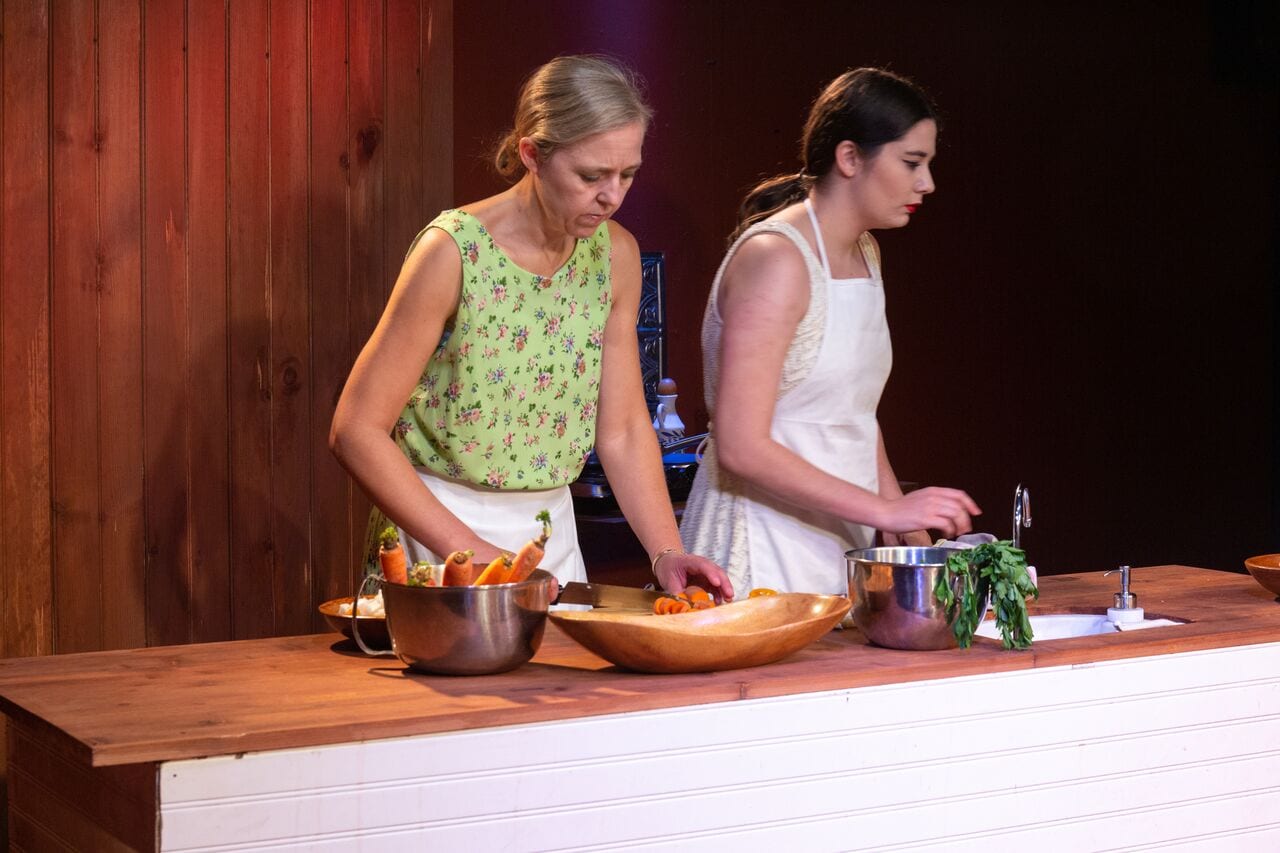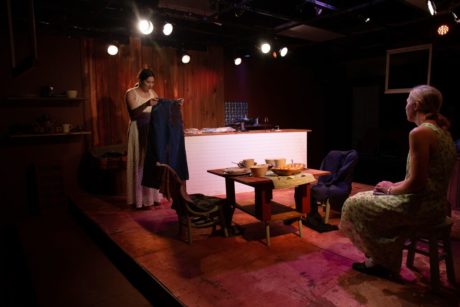Ambiguous loss that binds two people together while pushing them apart. Incompatible paths of grief that alienate each other’s only source of connection. The dominating presence of someone who is absent. Silence when there is nothing more to say. Thoughts and dreams expressed only in solitary fantasy. The comfort and tyranny of domestic ritual.
Such is the world of Zoja (Amy Rhodes) and her daughter-in-law Shkurta (Catherine Gilbert) in the English-language premiere of Kosovo playwright Doruntina Basha’s absorbing, nuanced The Finger at Venus Theatre in Laurel. The loss they have suffered is that of Zoja’s son, Shkurta’s husband, one of the “disappeared” in the wars following the breakup of Yugoslavia. Nothing has been heard from him in ten years, no remains brought home in a body bag. There is only an unanswerable question, unending uncertainty overlaid with dread.

Directed with intelligence, subtlety, and sensitivity by Venus founder Deborah Randall, the actors explore the distorted, cramped lives they lead in a small kitchen. The set (designed by Rhodes) echoes the distortion – a table and chairs have uneven legs, as if sinking into the ground – and the claustrophobic emotional space they inhabit is well portrayed by the tight physical spaces on the small black box stage.
Like Kate Keller in All My Sons, who refuses to believe her M.I.A. son is dead, Zoja insists that her son will come home some June 10, the anniversary of his kidnapping. Every year on that date, the women prepare his favorite meal and set a place at the table for him. The preparations for the meal are fraught, Zoja demanding that Shkutra chop the vegetables just the right way. (The actors actually cook the meal on stage, lending an enticingly sensual aroma contrasting with the austere physical and emotional surroundings.)
It is during this chopping that Shkutra cuts her finger, leading to harsh accusations from Zoja of incompetence. Look at my hands, the older woman says – not a scar on them. The importance of hands for women’s work is a recurring theme. In a fantasy sequence in which Zoja tells her backstory to an interviewer (played by Gilbert) – a chance to say things she can’t say to anyone in her reality – she explains that her mother, whose hands were full of scars, once cut off her finger while cooking, stoically continuing to prepare the meal after throwing the finger into the trash.
She also describes to the interviewer her marriage to a cowardly, abusive man, with whom sex is rape and domestic violence is an everyday matter. He makes life-changing decisions without discussing them with her. In the marriage, she was expected to be seen and not heard, to speak only when spoken to, and to obey orders, a pattern she reproduces in her imposition of similar demands on Shkurta.
Shkurta is certain her husband is long dead and that the annual meal ritual is foolish and futile. Unlike her mother-in-law, she loved her husband, and stores what she has left of him – his old clothes have become her sacred objects – in a suitcase. She hopes for a life different from her near-imprisonment with Zoja, perhaps back in her mother’s village, or in a fantasy scene, a perfect home or apartment in a city (Rhodes plays her comically enthusiastic real estate agent, complete with red wig and southern accent).
How does a woman, especially in a traditional society, find and express her voice? Zoja did not, and resents Shkurta’s attempts to do so, frequently shutting her up and ridiculing the notion that anyone would care what she thinks or says. The two women have long silences in their communication, filled, perhaps, with what they cannot say or have already said long before. Silence is a key element of the production. After Shkurta has spread her husband’s clothes throughout the room, filling the space with what remains of him, Zoja, in a kind of wordless aria, carefully folds each item and replaces it in the suitcase.

Like silence, what isn’t seen can be powerful. After cutting her finger, Shkurta speaks of her invisible blood pervading the house. The wind speaks of trees that have eyes, if their message could only be understood. In Neil McFadden’s sound design, dramatic and melancholy solo cello music between scenes expresses a depth of feeling from which the characters refrain.
Intensity and dramatic tension need not be loud. The production is a master class in actors portraying deep emotion in a quiet, restrained way; no scenery chewing here. Each character has a default facial expression: frowning resentment in Zoja’s case, pained sadness in Shkurta’s. Small variations from the default – a flash of manifested anger, a rarer moment of tenderness, each woman’s more open expression during the fantasy scenes – resound.
Like many a strong script, The Finger raises questions it does not attempt to answer, to which a definitive answer would be far too neat. How long is grief, how can one not be a prisoner of it and yet honor and and value what was lost? How do we determine what we can accept, and balance that acceptance, or lack of it, with thoughts of the future, if we can think of the future at all? How do we forgive, and what do we need to forgive? Can we avoid simply going around in circles, replaying what cannot change (a concept Randall stages beautifully at one point)?
I readily confess that there are details and nuances of this play and the acting I probably missed on a first viewing. It is, I believe, a play worth seeing more than once. Located in a Laurel side street storefront off the beaten track of the DMV theater scene, Venus can struggle to attract sizeable audiences. This play, and this theater company, have earned and deserve large and appreciative audiences, and I strongly recommend to readers that they take the opportunity to see The Finger. You’ll wind up not only admiring the production but thinking about what you’ve seen well after its conclusion.
Running Time: Eighty-five minutes, with no intermission
The Finger plays through October 13, 2019, at Venus Theater, 21 C Street, Laurel MD. For tickets, call (202) 236-4078 or go online.




